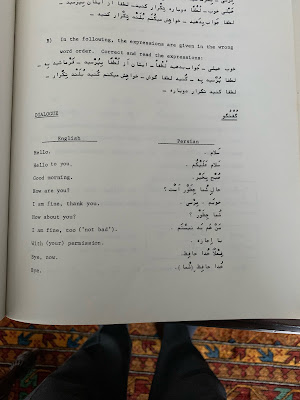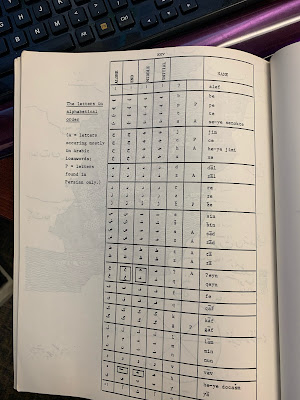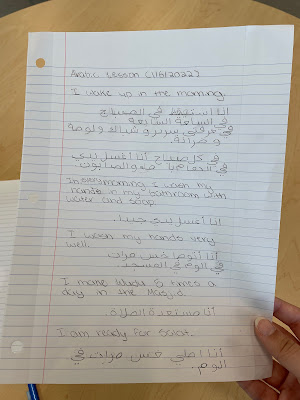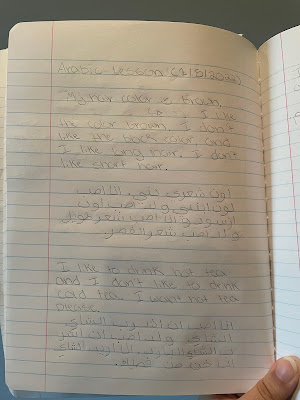Posts
Day 7!
- Get link
- X
- Other Apps

To start off the day, we started by reviewing all of the lessons that we've learned so far. We started off with reviewing pronouns, and then the verb "To be" (Hastam). In addition to this, we reviewed the conjugations of Hastam with each of the pronouns, like: من آم (I am), شما استيد (You are), and many more! Afterwards, we started to learn some new vocabulary by looking at a conversation in Farsi. This was definitely a little bit difficult to grasp initially, but after a little bit of practice, it definitely got easier to say out loud. Dr. Dar and practice the conversation out loud, with each of us being one of the people in the conversation. The main vocabulary that I learned in this lecture were phrases and words like !سلم عليکم (Hello!), چطور (How), and many more! We continued to go through the conversation and reviewed it for awhile, before then going back to the previous lessons to review all of them again one more time! This was definitely a lot of information to ...
Day 6!
- Get link
- X
- Other Apps
For today, we started off the morning by continuing our lessons in Farsi. Dr. Dar and I reviewed the lessons that we learned this week, specifically, pronouns and the verb "To be." As we continue to review each lesson, I feel like I'm kind of getting the hang of everything, as it feels much easier to me than Arabic has been for the time that I've spent learning both of these languages. In addition to reviewing the previous lessons, we also learned about the numbers in Farsi. The pronunciation of the numbers in Farsi is much more different than it is in Arabic, however, some of the numbers, like 9 (نه) and 10 (ده) sound similar to both numbers are also said in Kashmiri. This similarity definitely made it a little bit easier to remember some of the Farsi numbers when we started to learn them. Afterwards, we reviewed the numbers for a little bit, and then we moved on to time. Specifically, Dr. Dar focused on how to say phrases like "It's 1'o clock", or...
Day 5!
- Get link
- X
- Other Apps

Today, we started off with a lesson by Dr. Dar about the alphabet in Farsi, as it's a little bit different to the one in Arabic. This was a little bit surprising to me, as I didn't know that the alphabet in Farsi would be so different to the one that I already knew in Arabic. The main differences between Arabic and Farsi, in terms of their alphabet, is the pronunciation and the letters. Farsi has some letters that aren't there in Arabic, like پ (Pe) and چ (Ce). This was definitely a little bit difficult for me to get used to, because I wasn't used to the different pronunciation of some letters, but it wasn't super hard to get the hang of after we went over it a little bit during the lecture. After going over the alphabet, we then moved onto pronouns. These were also different to Arabic pronouns, as there aren't as many types of how to say "You are" in Farsi as there are in Arabic. For the rest of the lesson, and for a lot of the day, we mainly just con...
Day 4!
- Get link
- X
- Other Apps
This morning I started off by continuing to read articles about Naguib Mahfouz. Specifically, I read an article that briefly went through Mahfouz's life, and one of the stories he wrote, which was Children of the Alley . This book brought a lot of hate towards Mahfouz, which was also talked about in the article I read yesterday. Specifically, this hate came from the story's "depiction of God and the prophets" in Islam. This specific part of the article surprised me a little bit, as I didn't realize that some of Mahfouz's stories went much more past the boundaries of Arabic Literature that existed at the time. I knew beforehand that he helped further develop Arabic Literature into what it is now, but I never knew the specifics of some of the other stories that he wrote during his time as an author. Afterwards, I finished reading the article! Then, I took a little break and ate my lunch! In the afternoon, I continued with my Arabic Lesson with Ms. Samira! For t...
Day 3!
- Get link
- X
- Other Apps

Compared to the last two days, today was a little bit more Arabic Literature heavy, as I started off the day by reading this article about Naguib Mahfouz , that was given to me as in-class work by Dr. Dar yesterday. The article talked about many different topics surrounding Mahfouz, specifically his adaptation of The Arabian Nights , and the meaning behind his ending of his adaptation of this story. While reading this article, one specific aspect of Mahfouz's life that I never thought about was the fact that he received a lot of threats, specifically from an Islamist group. I never thought that Mahfouz's stories would cause any group of people to become so angry like that, but it turns out that I was wrong, as mentioned in the article, Mahfouz was attacked by a member of this group on October 14th, 1994. This attack left him barely able to write as much as he used to. I also thought that Mahfouz didn't deserve to have this type of attack against him, as I still don't u...
Day 2!
- Get link
- X
- Other Apps

For our the second day, we started off with a lecture from Dr. Wasim Dar about Arabic Poetry and it's development. Before starting the lecture, we also reviewed a little bit of the information that we learned about Arabic Literature yesterday, including the NPR interview that I listened to for homework. The interview was Professor Roger Allen, of University of Pennsylvania. Specifically, he talked about Naguib Mahfouz and his stories in Arabic Literature. Afterwards, we started our lecture on Arabic Poetry. This was something that I knew a little bit about beforehand, but it was still interesting to learn more in-depth about how Arabic Poetry was, as well as how it further developed in comparison to Arabic Literature. Specifically, we first talked about Arabic Poetry in general. In comparison to Arabic Literature, poetry was more restrictive, however, both of them went through the same phases of development. A majority of the lecture was focused on the form of Arabic Poetry, which...